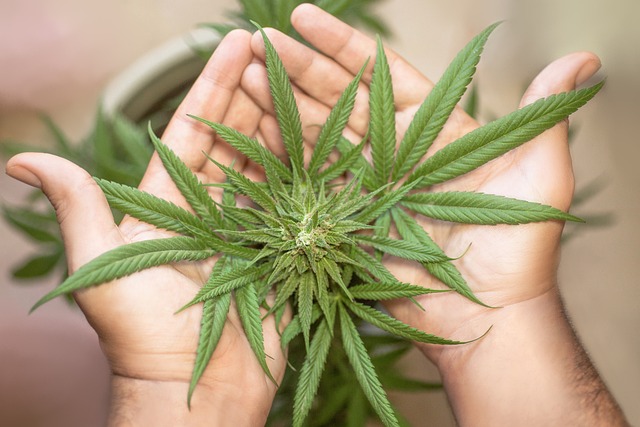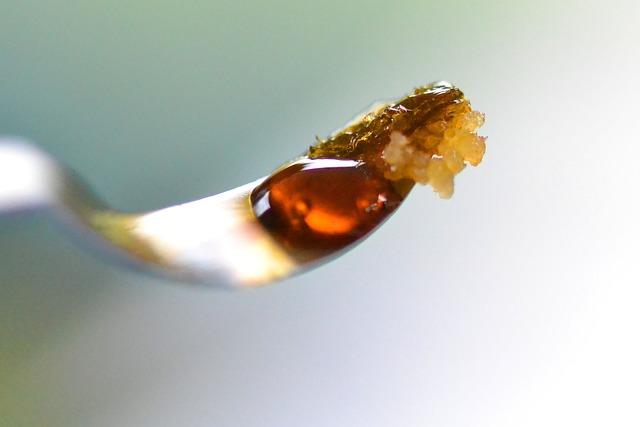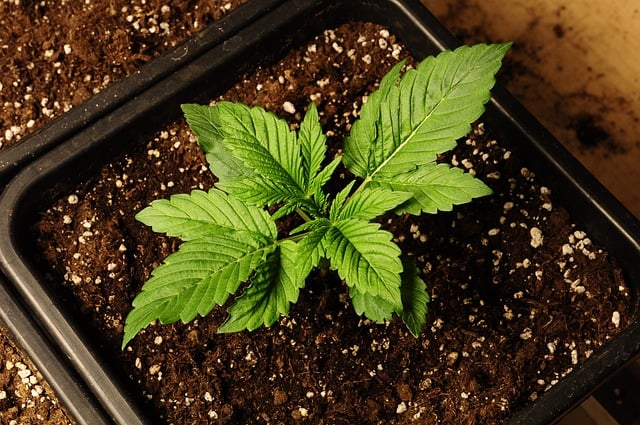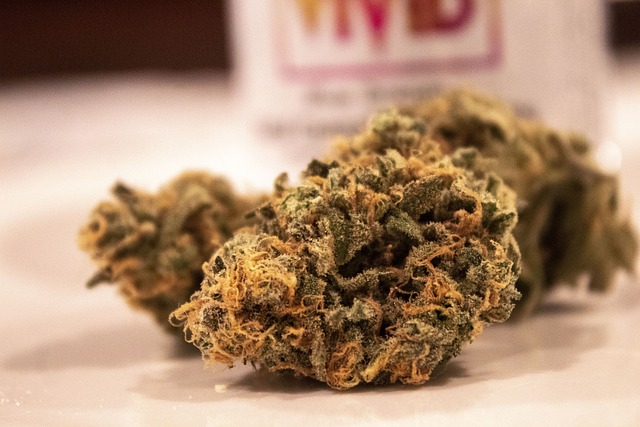THCA-rich cannabis topicals have emerged as a non-psychoactive option for localized pain and inflammation relief, harnessing the benefits of THCA, a cannabinoid found in the cannabis plant that doesn't induce psychoactive effects. These topicals, including creams, balms, and salves, are designed for targeted application to address issues like arthritis and muscle soreness without causing a high. The sale of these products is expanding as they gain acceptance for their therapeutic potential, particularly in managing chronic pain and skin conditions. They are available through reputable vendors following the legalization under the 2018 Farm Bill, which allows hemp-derived THCA with less than 0.3% THC content, though specific state laws vary. Users should always purchase from trusted sources, adhere to proper application methods, and follow label instructions for optimal results. These products are intended solely for external use, and individuals should consult healthcare professionals before incorporating them into their health regimen, especially if undergoing other treatments or managing chronic conditions. Safety, legality, and quality assurance are paramount when considering the inclusion of THCA-rich cannabis topicals in one's wellness routine.
Exploring the multifaceted impact of THCA-rich cannabis topicals, this article delves into their potency and therapeutic benefits, guiding consumers through the legal considerations and safe usage for optimal skincare and pain relief. From understanding the precursor role of THCA to its effects when applied topically, we provide a comprehensive overview of how these products can be integrated into health and wellness routines. Join us as we navigate the intricacies of THCA rich cannabis topicals sale and ensure informed decision-making in their application.
- Unveiling the Potency of THCA-Rich Cannabis Topicals: A Comprehensive Overview
- Understanding THCA: The Precursor to THC and Its Implications for Topical Use
- Benefits and Applications of THCA-Infused Topicals in Skincare and Pain Relief
- Exploring the Therapeutic Properties of THCA Flower Side Effects
- Navigating the Legal Landscape of THCA-Rich Cannabis Topicals Sales
- How to Select and Use THCA-Rich Cannabis Topicals Safely and Effectively
Unveiling the Potency of THCA-Rich Cannabis Topicals: A Comprehensive Overview

THCA-rich cannabis topicals have gained significant attention in the wellness market, offering a non-intoxicating alternative to smoked or ingested cannabis products. These topicals are infused with THC Acid (THCA), which is the raw form of tetrahydrocannabinol (THC) and possesses its own unique properties distinct from its decarboxylated counterpart, THC. THCA is recognized for its potential therapeutic benefits, including anti-inflammatory and pain-relieving effects without the psychoactive effects associated with THC.
The burgeoning market for THCA-rich cannabis topicals sale has led to an array of products available to consumers, ranging from creams and balms to ointments and lotions. These topicals are specifically designed to penetrate the skin, targeting localized areas where relief is needed most. The efficacy of these topicals is attributed to the interaction of THCA with the body’s endocannabinoid system, which regulates various physiological processes including pain, inflammation, and immune response. As such, THCA-rich cannabis topicals are increasingly being explored as a means to manage chronic pain, arthritis, and other skin conditions, providing a safe and targeted approach for those seeking relief from certain ailments without the ‘high’ typically associated with cannabis consumption.
Understanding THCA: The Precursor to THC and Its Implications for Topical Use

THCA, or tetrahydrocannabinolic acid, is a naturally occurring compound found in the cannabis plant that serves as the precursor to THC, the psychoactive element commonly associated with cannabis use. As interest in the therapeutic potential of cannabinoids grows, THCA-rich cannabis topicals have gained popularity due to their ability to offer localized relief without the psychotropic effects of THC. These topical applications harness the unique properties of THCA, which, unlike its decarboxylated counterpart THC, does not induce a high but is believed to interact with the body’s endocannabinoid system in ways that may alleviate pain and inflammation.
The implications for topical use of THCA-rich cannabis are significant, particularly as consumers and healthcare professionals seek effective, non-psychoactive alternatives for pain management. Topicals infused with THCA can penetrate the skin, targeting specific areas without systemic effects. This targeted approach is ideal for conditions like arthritis, muscle soreness, and dermatological issues, where direct application can lead to localized relief. The availability of THCA rich cannabis topicals for sale is a testament to the growing acceptance of cannabinoid therapy and reflects an emerging market that caters to a diverse range of needs, from pain relief to skincare. As research continues to unveil the potential benefits of THCA, these products are likely to become even more prevalent in consumer health choices.
Benefits and Applications of THCA-Infused Topicals in Skincare and Pain Relief

THCA, or Tetrahydrocannabinolic Acid, is a non-psychoactive compound found in cannabis that has garnered attention for its potential therapeutic properties. As consumers and researchers alike delve into the realm of cannabinoids, THCA-infused topicals have emerged as a popular choice for those seeking the benefits of cannabis without the psychoactive effects. These topical applications are not only available in various forms such as creams, balms, and salves but are also gaining momentum in the market with THCA rich cannabis topicals sale becoming more prevalent.
One of the most significant advantages of THCA-infused topicals is their role in skincare. THCA’s anti-inflammatory properties make it an excellent ingredient for addressing skin irritations, redness, and blemishes. Its antioxidant effects also contribute to protecting the skin against environmental stressors, promoting a healthier and more radiant complexion. Additionally, these topicals can be tailored to cater to different skin types, ensuring that a wide range of individuals can reap the benefits. Beyond skincare, THCA topicals are also celebrated for their analgesic properties, offering relief from localized pain without the high associated with its more well-known derivative, THC. Users often report that these topicals provide effective pain management for conditions like arthritis, muscle soreness, and nerve pain, making them a valuable addition to holistic health routines. The convenience of applying the product directly to the affected area makes THCA-infused topicals a practical solution for targeted relief, contributing to their growing popularity in the wellness industry.
Exploring the Therapeutic Properties of THCA Flower Side Effects

In recent years, there has been a growing interest in the therapeutic properties of THCA flower, which is the raw form of tetrahydrocannabinolic acid, a prominent cannabinoid found in cannabis. Unlike its decarboxylated form THC, THCA is non-psychoactive, allowing users to experience potential health benefits without the high associated with traditional cannabis use. This has led to an increase in the availability of THCA rich cannabis topicals on the market, catering to a diverse range of consumers seeking natural relief from various conditions. Topicals infused with THCA are applied directly to the skin, offering targeted relief for muscle soreness, inflammation, and skin irritations. Users report that these products can effectively manage pain without the side effects commonly associated with oral cannabinoid consumption. Moreover, as these topicals do not enter the bloodstream, they avoid systemic intoxication, making them a safe and convenient option for those sensitive to psychoactive effects or subject to drug testing. It’s crucial for consumers to explore reputable sources for THCA rich cannabis topicals sale to ensure product potency and safety. As with any health-related product, it is advisable to consult with a healthcare professional before incorporating these into one’s wellness routine, especially if taking other medications or managing chronic conditions.
Navigating the Legal Landscape of THCA-Rich Cannabis Topicals Sales

Navigating the legal landscape for THCA-rich cannabis topicals sales is a complex task that requires a thorough understanding of federal and state regulations, as well as the evolving legal framework surrounding cannabis products. At the federal level in the United States, the 2018 Farm Bill legalized hemp derivatives, including THCA, which is found in hemp but not in marijuana, providing that these derivatives contain less than 0.3% THC on a dry weight basis. However, the legality of selling THCA-rich cannabis topicals varies by state, with some states allowing their sale for both medical and recreational use, while others maintain strict restrictions or outright bans.
Sellers must stay informed about the changing regulations, as well as the specific requirements within each jurisdiction where they intend to operate. This includes obtaining proper licensing, adhering to labeling and advertising standards, and ensuring that all products comply with potency and contaminant thresholds set forth by state regulators. Additionally, because THCA is a cannabinoid that can convert to THC under certain conditions, such as heat or light exposure, sellers must take precautions during the manufacturing process to maintain legal THC levels. Understanding the nuances of these regulations is crucial for any business involved in the sale of THCA-rich cannabis topicals, as non-compliance can lead to legal challenges and the seizure of products.
How to Select and Use THCA-Rich Cannabis Topicals Safely and Effectively

When incorporating THCA-rich cannabis topicals into your wellness routine, selection and usage are key to maximizing their benefits while minimizing potential side effects. Begin by choosing high-quality topicals from reputable sources, as they often contain the precise concentration of THCA advertised. Look for products that clearly list their ingredients and THCA content on the label, ensuring purity and potency. Topicals are designed for external use only; avoid ingestion or application near sensitive areas like the eyes or mouth to prevent irritation.
To use THCA-rich cannabinoid topicals effectively, start by cleansing the area you wish to treat. Apply a generous amount of the topical directly to the affected skin area, gently massaging it in until fully absorbed. The efficacy of these topicals can be influenced by the skin’s condition and the specific ailment or concern you aim to address. Factors such as skin thickness and the presence of hair can affect absorption, so consider these when applying. For best results, consistency is crucial; use the product as directed on the packaging or by a healthcare professional. Keep in mind that individual responses to THCA can vary, and it’s always advisable to conduct a patch test initially to ensure no adverse reactions occur. Topicals with higher concentrations of THCA may offer more pronounced effects, but always begin with a lower dose to gauge your body’s response before considering higher doses. Remember to purchase these topicals from sales channels that prioritize quality and legality, ensuring both safety and efficacy in your wellness journey.
In conclusion, THCA-rich cannabis topicals have emerged as a significant addition to wellness routines, offering a range of benefits from skincare enhancement to pain relief, all without the psychoactive effects commonly associated with THC. As we’ve explored, these products are not only potent but also versatile in their applications. Users interested in incorporating THCA-rich cannabis topicals into their regimen should approach their selection and application with consideration of individual needs and legal guidelines. With the increasing availability of THCA-rich cannabis topicals for sale, understanding both their therapeutic properties and potential side effects is crucial for maximizing their benefits while minimizing any adverse reactions. As the market continues to evolve, informed usage and responsible consumption will shape the future of this burgeoning industry.
